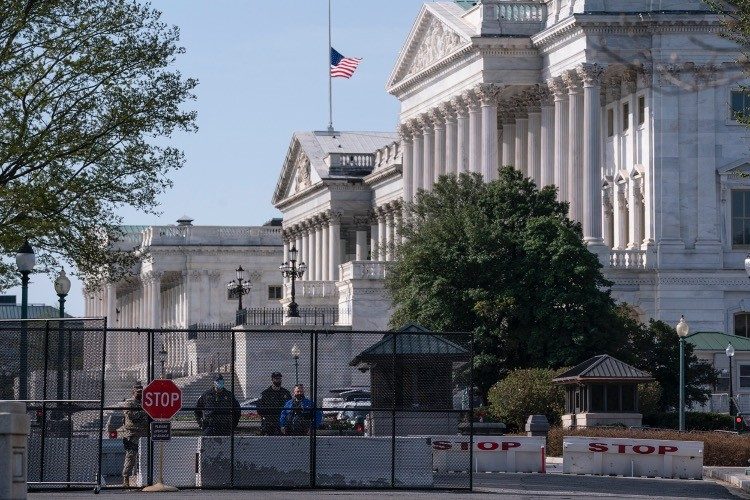
While many Democrats running America’s cities have been defunding their police departments, the Beltway Democrats are trying to militarize the Capitol. Nearly all House Democrats — the same people who supported the “Defund the Police” movement and opposed Trump’s border wall and called it a waste of money — want more police, more fencing, and other enhanced security measures to protect them. On Thursday, they passed a $1.9 billion spending bill to upgrade Capitol security in the wake of the January 6 Capitol protests.
A tight 213-212 vote came after an 11-hour scramble on the floor, with the far-left Representatives known as “the Squad” nearly tanking the legislation. All Republicans present voted against it, and three Democrats crossed party lines to oppose the security bill, namely, Representatives Ilhan Omar of Minnesota, Ayanna Pressley of Massachusetts, and Cori Bush of Missouri. Fellow “Squad” members Alexandria Ocasio-Cortez of New York and Rashida Tlaib of Michigan voted “present,” as did Jamaal Bowman of New York.
Though “the Squad” members are vehemently anti-Trump, they have opposed expanding “domestic terror laws” in the wake of the January riot. However, their stated concern was less for the well-being of Donald Trump’s supporters, but for the “black, brown, indigenous, people of color and leftist groups” Tlaib claimed would be targeted by any such laws.
Unexpected Republican allies Bush, Omar, and Pressley said in a joint statement that “We cannot support this increased funding while many of our communities continue to face police brutality while marching in the streets, and while questions about the disparate response between insurrectionists and those protesting in defense of Black lives go unanswered.” They also complained the bill “does far too little to address the unspeakable trauma of the countless officers, staff, and support workers who were on site that day.”
The bill would, indeed, dramatically expand security around the Capitol. $730 million would be used to pay “reimbursement” to the Capitol Police, the D.C. police, the National Guard, and other federal agencies that responded on the day of the riot and that were present in the city afterwards, until May 23. $520.9 million would pay for the National Guard deployment, $66.8 million would go to the District of Columbia, and $43.9 million to the U.S. Capitol Police. Nearly $40 million is directed for the prosecution of the rioters already arrested.
The bill directs more than $950 million to harden the Capitol and install new security measures for members of Congress, a sharp increase from $585.8 million allocated in 2020. The lion’s share of the funds — $529.7 million — would be used to upgrade the architecture of the Capitol building, including $250 million to ramp up physical security of the Capitol complex infrastructure, and potentially install retractable security fencing to replace the steel boundary in place around the Capitol since January.
Among other provisions, $200 million would be used to set up a “quick reaction force” to back up Capitol Police in any future emergencies, and $21.5 million to the House sergeant-at-arms to ramp up protection details for members. So just like that, responsible people carrying guns are welcomed by anti-gun Democrats.
The bill also includes $500,800 for new trauma counselors and support for the Office of Employee Assistance.
Democrat legislators thoughtfully provided $155 million for miscellaneous issues “related to COVID-19,” such as enhanced cleaning, personal protective equipment, telework equipment, and overtime pay for the members of the Congress; and hotel rooms for officers and staff unable to return home due to positive cases of the coronavirus.
While the bill squeaked through the House, it faces an even more uncertain fate in the Senate, where the Democrats hold a single-vote majority and will need to win over 10 Republicans to ensure its passage.
Senate Appropriations Committee Chairman Pat Leahy (D-Vt.) raised concerns during talks and more recently issued a statement, saying that even though he is “committed to moving a bill in the Senate to address these important needs … we must make sure we are making smart investments in our security based on lessons learned. It is important to me that the Capitol, a potent symbol of our democracy, remains open and accessible to the public and does not feel like a militarized zone.”
Republican opposition centered around the bill’s cost, but also around its potential to permanently militarize the Capitol. Allocating $200 million for a quick reaction force “raises serious concerns about the role of our military on American soil,” Representative Kelly Granger (R-Texas) said during debate on the bill. House and Senate Armed Services Committee ranking members Mike Rogers (R-Ala.) and James Inhofe (R-Okla.) said in a statement Wednesday, “We cannot and should not militarize the security of the Capitol Complex.”
Senator Richard Shelby (R-Ala.), the top Republican on the Appropriations Committee, said Congress should study the spending methodically rather than “rush to judgment and throw a lot of money at something.”
“I think we are pushing the pause button here,” Senate Minority Leader Mitch McConnell (R-Ky.) said on Tuesday, suggesting that no money be spent until Congressional hearings into the riot are concluded.



